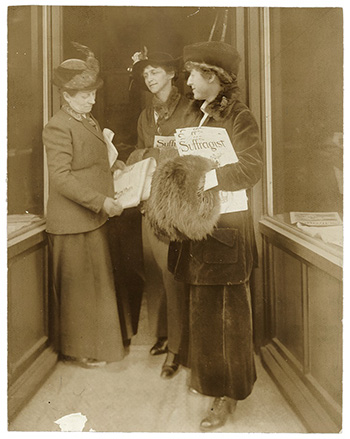100 Years of Voting: Honoring the Legacy of Suffragists
How Museums are Telling the Story of American Women’s Fight for the Right to Representation

On August 18, 2020, the United States celebrates the 100th anniversary of the ratification of the 19th amendment, which gave women the right to vote. Organizations supporting women’s rights became more active in the mid-19th century, and suffragists lectured, marched, lobbied, and practiced civil disobedience to achieve what many Americans considered radical change.
However, the fight was not over. It required decades of struggling to include African Americans and other women of color in the promise of voting rights. But the 19th Amendment changed the face of the American electorate forever. And since then, women—despite legal and cultural barriers—have been actively engaged in every phase of the nation’s history.
Today, many IMLS grantees continue to honor women’s history and the organizations that fought for women’s rights.
In 2018, the New-York Historical Society received a Museums for America grant to develop and disseminate its free online women’s history curriculum, “Women and the American Story” (WAMS). WAMS was designed to connect educators with classroom resources that showcase contributions to America’s history by women of color.
To establish the curriculum, museum staff researched, designed, wrote, and disseminated 10 thematically and chronologically divided units that align with social studies curriculum standards from across the country. The units are each bookended by significant moments in American and women’s history.
The curriculum is available on an interactive website, where each unit includes an introduction, high-resolution images or 3D renderings, relevant documents or artifacts from the museum’s collection, descriptions of these resources providing historical context, discussion questions, and biographical portraits of key figures in the movement. This is an ongoing project, with two units scheduled to be released each fall until 2022.
The Brooklyn Museum used IMLS funding to design and implement “Shifting Focus: Looking Feminist at the Brooklyn Museum,” a museum-wide examination of how feminism informs our daily experiences and the way we look at the world. In 2016, every floor of the museum, including both the permanent and special exhibition galleries, invited visitors to consider art, art history, and the presentation of the stories told from a feminist standpoint. The museum also developed a mobile app, which allowed visitors to compare traditional labels versus the feminist interpretations created for the project.
The Brooklyn Museum continues to highlight women in history throughout their artwork and installations. From August 2019 to March 2020, they presented “Half the Picture: A Feminist Look at the Collection,” which featured more than 100 works from the museum’s collection and explored a wide range of art-making, focusing on enduring political subjects encompassing gender, race, and class that remain relevant today. Before the pandemic shutdown, they were slated to present “Out of Place: A Feminist Look at the Collection,” that showcases artwork that defies conventional museum display and collecting frameworks.
Meanwhile, the Rosa Parks Museum at Troy University received an award through the Museum Grants for African American History and Culture program in 2018 to develop two traveling exhibitions highlighting the nonviolent protests associated with the Montgomery Bus Boycott, which was organized to overcome unconstitutional segregation laws on public transportation.
The “Legacy of Rosa Parks” exhibition provides an overview of the history of the museum, the life of Rosa Parks, the success of the boycott, and the relevance of nonviolent disobedience today. The “Women of the Montgomery Bus Boycott” exhibition features oral history interviews, as well as digitized archival material and court documents that tell the heroic stories of Jo Ann Robinson, Aurelia Browder, Claudette Colvin, Mary Louise Smith, and Lucille Times. The exhibitions travel all over the country to K–12 schools, universities, places of worship, public libraries, and other museums.
This year, the Amistad Research Center received IMLS funding to expand access and use of its archival collections by documenting the work of African American women leaders in a variety of fields, including the arts, social justice activism, labor activism, civic leadership, politics, and business. Research from this project will serve as the foundation for background, design, and installation of both a physical and online exhibition titled “A Range of Experiences: Documenting African American Women’s History and Achievements.”
These amazing women, and others, helped shape modern American society. Their stories of struggle and dedication have continued to influence people for generations.
Photo: Rep. Jeanette Rankin of Montana, left, reading The Suffragist, Washington, ca. 1917-1918. - courtesy of Women of Protest: Photographs from the Records of the National Woman’s Party, Manuscript Division, Library of Congress, Washington, D.C.